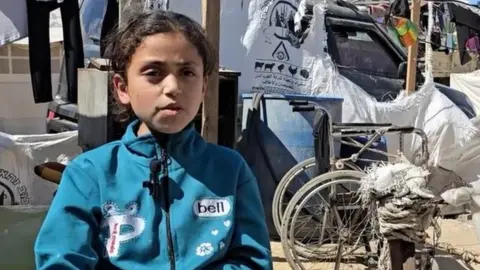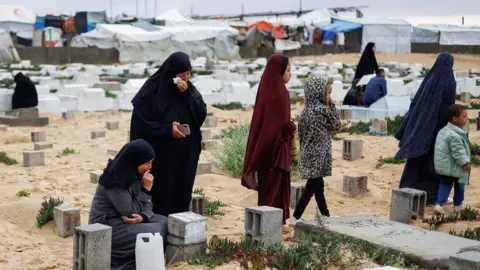April 10, 2024 marked Eid-Al-Fitr, one of the holiest holidays in Islam, when the end of the Islamic month of Ramadan is reached. During this day, over a billion Muslims spend time with their families, visiting mosques for Eid prayers, and they often feast, making up for the fasting during Ramadan. It is meant to be a time of happiness, joy, and worship. Yet sadly this is not the case in Palestine, which has been facing brutal conflict since October 7, 2023, when the terrorist group Hamas launched a massive ambush on Israel, killing about 1,200 and kidnapping men, women, and children. In the ensuing conflict, over 30,000 Palestinians have been killed according to local health associations, over a million on the brink of starvation, and even more being rendered homeless due to constant conflict. With the holy days of Laylat-Al-Qadr and Eid-Al-Fitr being so recent, what have Muslims in both Palestine & Israel had to face?
The Last Friday of Ramadan: Laylat-Al-Qadr in Palestine
Friday, April 5, marked one of the most important days of Ramadan: “Laylat Al-Qadr” or “The Night of Power”, which commemorates when the Quran was said to have been revealed to Prophet Muhammad. In most of the world, this day was celebrated with many flocking to mosques not only for Jummah, the noon Friday prayer, but also for the other prayers of the day and night. In both Gaza and Israel, this was no different. However, in both Israel and Palestine it would be marked by cruelty and tragedy.
In Gaza, many gathered for prayer on this Friday. Unfortunately, this gathering would be in tears and in sadness, as many mourned the loss of their loved ones killed by Israeli bombardments. They did so within the ruins of mosques that had been destroyed. One of the most notable of these was the Great Omari Mosque, built in the 13th century. One of the final vestiges of the mosque is still being used by worshippers, yet most of it now lies as rubble after the main structure of it collapsed on December 7. The Great Omari Mosque is one of many that have been destroyed by the IDF. In fact, on October 9 alone, a strike destroyed a refugee camp and three mosques: the Al-Shati Refugee Camp, the Al-Gharbi mosque, Yassin mosque, and Al-Sousi mosque.

During the last Friday of Ramadan, Muslims believe their prayers will be granted by God, yet for Palestinians, that hope appears to be waning. According to a Palestinian man named Sabah, 54, who says,
“There is nothing sweet about the feast this year. People are not celebrating. Everything is bitter in my mouth. It is so painful at this time which is all about family.”
Iftar, the nightly feast that marks the end of fasting for the day, is usually held in mosques, restaurants, or in homes with friends and family. For Palestinians however, with entire neighborhoods, mosques, and businesses having been destroyed by the IDF, Gazans now celebrate Iftar in tents or outside, certainly in fear of being bombarded.

Laylat-Al-Qadr in Israel
In Israel, Ramadan has largely been peaceful between both Jews and Muslims despite the war in Gaza. Every day, thousands of Muslim worshippers gathered at the Al-Aqsa Mosque, a holy site in Judaism, Christianity, and Islam. On the last Friday of Ramadan, for Laylat-Al-Qadr, over a hundred thousand worshippers gathered at Al-Aqsa for morning prayer. Unfortunately, access to the mosque has been restricted by Israeli police, which has led to tension increasing in Jerusalem. On April 5, conflict reached a breaking point between protestors and Israeli police. At one point, a man launched a firework at an Israeli police officer, causing the Israeli police to fire back with an absolutely brutal retaliation.

The retaliation was to use drones to drop tear gas onto the thousands of men, women, and children praying at the mosque. Western media referred to these events as “scuffles,” or as “clashes,” yet it appears that “terrorism” is a more fitting word. If this occurred in an Islamic nation with Jews chanting for an Islamic government to be toppled, and then the forces of the Islamic nation dropped tear gas onto thousands of praying Jewish men, women, and children, it would be viewed as a barbaric act of terrorism. The fact that the media is even pretending that somehow a firework and words are equal to an advanced force armed to the teeth with guns, drones, and gas is disgraceful.
This is far from the first time Al-Aqsa has seen violence. In 2023, Muslim worshippers attempted to stay the night within the mosque, because they believed that the Jews might perform a ritual sacrifice within, following calls by an extremist Jewish group, something forbidden in Islam and illegal under Israeli law. While Israeli law enforcement does permit worshippers to stay the night at Al-Aqsa, this is only done on the last ten nights of Ramadan, which this particular night was not. During a raid on the mosque by Israeli forces, firing stun grenades, rubber bullets, and beating people to the floor with batons, 50 people were injured and 400 were arrested. According to Israeli forces, stones were thrown by Muslims within the mosque, along with firecrackers when they attempted to enter.
The media also referred to this as a “clash,” although it appears that “terrorist attack by Israel” might be more appropriate. It appears that when Israeli forces commit such a heinous act, desecrate a religious site, it is a “clash,” as if stones and firecrackers are comparable to weapons of one of the most advanced police forces in the world.

Eid-Al-Fitr in Gaza
Five days later is Eid-Al-Fitr, one of the most holy times in Islam, lasting three days. It is usually a time of celebration spent with friends and family, and feasting to make up for the fasting of Ramadan. For Muslims, it is practically like Christmas, with gifts even being exchanged at times. This Eid-Al-Fitr however, was filled with worldwide support for the struggles of Palestinians, and hope that a cease-fire could be achieved. Unfortunately, the outlook for peace looks grim.
Gaza
While Eid is usually spent visiting the homes of friends and family, most Palestinians can do none of this, with 1.7 million being displaced according to the United Nations, and 1.1 million more facing starvation. In the words of seven-year old Tala Abu Amr, a Gazan girl living in a refugee camp in Rafah,
“On Eid last year, we played, celebrated and rejoiced together. But this Eid, we miss the taste of happiness… There are no toys and no friends to play with. They’re all dead.”
With the IDF preparing for an advance into Rafah, one can only pray that Tala and Palestinians like her, will survive the approaching assault into Rafah.


On Eid, the IDF said that they were “continuing to operate in the Central Gaza Strip and killed a number of terrorists over the past day.” However, they issued no comment on how they murdered the family of Nidel Abedeh, a Palestinian whose children and wife were killed by an Israeli airstrike. He stated to Reuters:
“Today is the first day of Eid. Our children have the right to have a happy life, a decent life,” Nidal told Reuters news agency. “[Israel’s] planes, its barbarism and arrogance, killed our children.”
At the same time, Al-Aqsa Martyrs Hospital was filled with the bodies of fourteen people killed when the IDF bombed the Nuseirat refugee camp. Another individual, Mrs. Islam Wahba, lost her husband and six relatives during an IDF airstrike shortly after Hamas’ October 7th attack, she said,
“When the prayers began, I started crying because it was my first Eid without my husband and so many of my family. When my children woke up, they began to look at pictures of their father and wish him a happy Eid. This is not Eid and cannot be Eid.”

Eid-Al-Fitr in Israel
In contrast to the brutality of Laylat-Al-Qadr, Eid-Al-Fitr was largely peaceful in Israel at first glance, yet still tense. At Al-Aqsa, 60,000 Muslims gathered to pray, although under heavy watch by Israeli police with some being barred from entry into the mosque and therefore needing to pray outside. Concerning West Bank Palestinians, only men over 60 and women over 50 were allowed to enter the mosque by Israeli police. The suffering of Palestinians in Gaza is an often talked about subject by Israeli Muslims, with Scholar Mustafa Abu Sway stating to the Guardian,
“Unfortunately, with all these sad stories coming from the Gaza Strip, they had a great impact on our psyche, and our hearts are broken.”

Amongst Israelis was the fear of a terrorist attack by Hamas on Eid, with Prime Minister Benjamin Netanyahu’s spokeswoman Tal Heinrich stating:
“Extremist terrorist organizations like Hamas, like Palestinian Islamic Jihad are trying to inflame the region and — even further, and not just our region. They have already called for attacks on Israelis and Jews during Ramadan.”
Fortunately, there were no terrorist attacks by Hamas on Eid in Israel.
A large number of West Bank Palestinians have expressed their devastation on being prevented from entering Al-Aqsa. To put this into perspective, a Muslim being barred from entering Al-Aqsa on Eid would be like a Christian being barred from entering St. Peter’s Basilica on Easter. Such feelings were expressed by Mustafa Bader, a lecturer and author from the West Bank, who stated to The Guardian:
“I was deprived from practicing the freedom of worship, but also from the freedom of movement. I can’t visit Jerusalem. I can’t visit family members who are living there. When you’re taking Jerusalem and not allowing us to visit it, it’s like taking something from inside us.”
Peace Unlikely
At the time of writing this, attempts at an Eid ceasefire failed, which resulted in more lives being needlessly lost. Along with this, Iran launched an attack on Israel, and although most of the missiles and drones sent were thankfully shot down before reaching their target. This appears to have destroyed attempts at reaching an agreement for a ceasefire, meaning that more will suffer in the near future.
